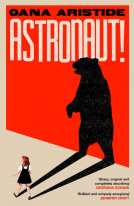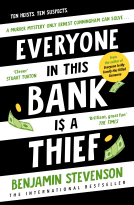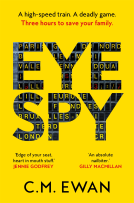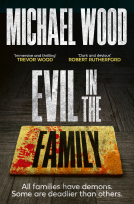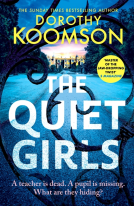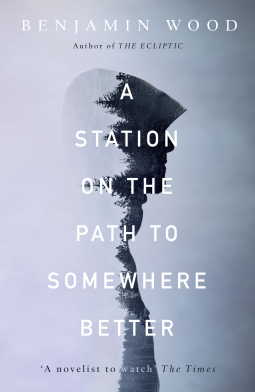
A Station on the Path to Somewhere Better
by Benjamin Wood
This title was previously available on NetGalley and is now archived.
Send NetGalley books directly to your Kindle or Kindle app
1
To read on a Kindle or Kindle app, please add kindle@netgalley.com as an approved email address to receive files in your Amazon account. Click here for step-by-step instructions.
2
Also find your Kindle email address within your Amazon account, and enter it here.
Pub Date 1 Aug 2018 | Archive Date 13 Jun 2018
Simon and Schuster UK Fiction | Scribner UK
Talking about this book? Use #SomewhereBetter #NetGalley. More hashtag tips!
Description
'One of the finest British novelists of his generation' Times
'A huge talent' Hilary Mantel
'Benjamin Wood is a magnificent writer and I intend to read everything he has written' Douglas Stuart
'What a writer' Richard Osman
‘With his third novel, Wood’s talent has burgeoned spectacularly. The book is a tremendous achievement, an unputdownable domestic thriller that is also subtle and moving … travelling well beyond his earlier fiction, Wood has produced a tour de force that marks his creative arrival’ David Grylls, SUNDAY TIMES
‘A novel written from the gut, and with a correspondingly visceral power. A superbly unsettling account of trauma and cautious recovery’ SARAH WATERS
'Elegant and disturbing … this is a novel of expertly woven tension and frightening glimpses into the mind of the deranged other’ John Burnside, GUARDIAN
The acclaimed author of Seascaper, Benjamin Wood writes a novel of exceptional force and beauty about the bond between fathers and sons, about the invention and reconciliation of self – weaving a haunting story of violence and love.
For twenty years, Daniel Hardesty has borne the emotional scars of a childhood trauma which he is powerless to undo, which leaves him no peace.
One August morning in 1995, the young Daniel and his estranged father Francis – a character of ‘two weathers’, of irresistible charm and roiling self-pity – set out on a road trip to the North that seems to represent a chance to salvage their relationship. But with every passing mile, the layers of Fran’s mendacity and desperation are exposed, pushing him to acts of violence that will define the rest of his son’s life.
‘Propulsive… a story that begins as a poignant, coming-of-age tale spirals almost imperceptibly into harrowing terror' DAILY MAIL
‘Tenderly dissecting the limits of love between parent and child while wriggling with a rich, thrilling tension, this palpably atmospheric story found its way beneath my skin and now lives there. Tell anyone who’ll listen, Benjamin Wood is one of the best novelists in Britain’ DAVID WHITEHOUSE
‘A shocking account of extreme violence and its complicated after-effects. It is a vivid and unsettling novel filled with surprises and insights’ IAN McGUIRE
'A heart-breaking and heart-stopping new novel; a dark Northern noir that moves at breakneck speed but never fails to be tender and vulnerable as well as visceral and terrifying' ANDREW McMILLAN
'A novelist to watch' The Times
Advance Praise
‘Tenderly dissecting the limits of love between parent and child while wriggling with a rich, thrilling tension, this palpably atmospheric story found its way beneath my skin and now lives there. Tell anyone who’ll listen, Benjamin Wood is one of the best novelists in Britain’ DAVID WHITEHOUSE
‘A shocking account of extreme violence and its complicated after-effects. It is a vivid and unsettling novel filled with surprises and insights’ IAN McGUIRE
'A heart-breaking and heart-stopping new novel; a dark Northern noir that moves at breakneck speed but never fails to be tender and vulnerable as well as visceral and terrifying' ANDREW McMILLAN
'A novelist to watch' The Times
Available Editions
| EDITION | Other Format |
| ISBN | 9781471126741 |
| PRICE | $20.00 (USD) |
Average rating from 11 members
Featured Reviews
Incertitude
Daniel Jarrett/Hardesty narrates the story as a memoir, starting in 1995 when he is due to leave on a road trip with his father, Francis (Fran) Hardesty, to visit the film set of ‘The Artifex’. Daniel is obsessed with the TV series, and it is only because of her son’s fixation with anything Artifex, that Kath allows Fran to take Daniel on this road trip to see the set and meet the actors, where Fran claims he works. Even with 12-year-old Daniel’s limited interaction with his father, he knows not to set his expectations too high.
Fran is an incurable womanising opportunist that has managed to destroy his marriage to Kath and consequently has been absent for most of Daniel’s life. Fran is a handsome, importune man that attracts women somewhat addictively. As the narrative progresses we get to know him as a totally unreliable and erratic person, prone to mood swings.
“He seemed to spend each new day of his life promoting compensation for the day before.”
It’s hard to say too much about the story without giving away spoilers but there is always a sense of doom and tragedy, <spoiler> especially at the start of the road trip when Daniel reflects that as he drove off it was the last time he ever saw his mother. </spoiler> We are treated to a simmering exposé of Fran’s life and his erratic behaviour, he has promised by hook or by crook, or by any other means, he is going to get his son to the set of The Artiflex. Sometimes this bubbling undercurrent felt like rambling but at a point, you realise you’re captivated. Not so much for the characters, which I didn’t have any empathy for, but for the inevitable shock waiting to pounce.
The narrative is subtle and gradually defines the relationship between father and son, and between the other characters really well. There is a tantalising element to the storyline which keeps us intrigued and not quite sure what course of actions Fran will take next.
The road trip culminates in a series of events that the reader will have to experience for themselves. Is this the Station on the Path to Somewhere Better?
Quite surprisingly those events do not bring the story to a conclusion and the remaining 20% of the book takes us on an exploration of memory, frustration and irresolution. How and why do we remember things the way we do? Why do we all remember events slightly differently?
Daniel as an adult obsessively tries to reconstruct events from his memory, witness statements, and video evidence. He struggles with the omissions, the perceptions and the tenuous connections of events. Why are there fissures in the substance of what people say? Are omissions deliberate, self-preserving, accidental, or a lapse of awareness? He torments himself with this, and on which parent is responsible for which personality trait.
A thoughtful story with frightful scares. Well worth a read!
Many thanks to Simon and Schuster UK Publishing and NetGalley for an ARC version of the book in return for an honest review.
 Alice H, Reviewer
Alice H, Reviewer
A Station on The Path To Somewhere Better blew me away, it is such a well written book.
It is a novel of two parts: the first, a thriller, of the lead up and description of the traumatic event, the second, a more psychological take on the after effects of witnessing something so awful, and Daniel’s attempts to craft a life from the fragments left behind. A shift in narrative and pace like this could throw a lesser author off, but Wood handles it very well.
The story builds and escalates as you read. We learn that, from the beginning, Daniel’s mother is not keen on the idea of her estranged husband taking Daniel on this roadtrip. But we assume that this is for no other reason than because he is a flakey father, he has let his son down numerous times before, and that he can’t be trusted not to take Daniel somewhere unsuitable. And the first part of the novel is just that; we start to see the unravelling of Fran’s lies – he takes Daniel to a seedy pub, he feeds him junk food. Because we are seeing the story through Daniel’s memories (or indeed, his interpretation of his child-self’s memories as an adult who has already had to recount this story numerous times, to police, to relatives, to therapists…more on this later), dark hints are laid throughout the narrative that the worst is still yet to come. We know, almost from the offset, that something terrible is to happen, and that Daniel himself will survive it, but the other ‘twists’ are revealed in advance too. It adds a terrible sense of foreboding to the narrative, everything becomes heightened and claustrophobic. It is very powerfully done.
The narrative style is worth a comment. It is a complex mix of the childhood naivety of the young Daniel, combined with hints to the emotional damage of the older Daniel, the sense that he’s had to recount the story many times before, and a fear that he’s forgetting, or misremembering. There are times when his guilt comes through, when he tries to justify his behaviour or the fact that he didn’t realise what was going to happen. This is very much the story of someone still in the grasp of PTSD – which becomes evident as we hear of Daniel’s life post the road trip. It is very cleverly, and sensitively handled.
That Daniel is a fan of the programme his father works on is no coincidence. He listens to the audiobook of it at first to pass the time in the car, but it soon becomes apparent that this isn’t the only work of fiction that he is listening to. Once the lies and inconsistencies from his father first start to reveal themselves, they steamroll. There is something very poignant in the description where Daniel, desperate to distract himself from what’s going on, makes calculations as to how long the battery on his walkman will last. It is a moment of stark contrast; reminding us how young and childlike Daniel is, and yet how terrifying and adult the situation he finds himself in is.
The prose is beautifully written, and quite often as I was reading I found myself outrightly admiring the writing style. The way Wood handles language is rich and brilliant, and also chilling in parts. On the one hand, there is the description of the physical geography of the road trip, which carries a preciseness with it that fits Daniel’s attempts to recreate the story as accurately as possible. On the other, Wood manages to capture the uneasiness of a bad gut feeling which creeps across Daniel and the novel, until you are certain that the only outcome can be tragedy.
The ending, for some, could be seen as slow paced, but personally I enjoyed the shift in tone. We see the enduring effects those fateful days have had on him, and how he lives under the shadow of his father – a man who he is terrified of turning in to. This is not quite a story of healing – that would be too simplistic – but there is something almost like hope at the end. It is a realistic hope, it is not the fairytale kind, there is still work to do. Work has already gone on, of course, there is mention of his coping mechanisms, therapists, the things he has done to counteract the wrongs of his father, but as in life, there is no magic solution, these are all just stations on his path to somewhere better.
Overall, this is a very strong, dark, thriller. It doesn’t shy away from trauma and the aftershocks in a way that stays with you long after you’ve read the last page. I couldn’t tear myself away, and I would thoroughly recommend to anyone.
A Station on the Path to Somewhere Better is an unnerving and raw novel about the aftereffects of violence and trauma. One morning in 1995, Daniel and his estranged father Francis set off on a road trip that is meant to help fix their relationship. Daniel’s mother doesn’t think it will, thinking that Francis will slide into his usual unpredictable ways. The further Daniel and his father drive, the more this turns out to be a trip unlike any other, and soon his father’s desperation and violence will be fully unleashed, and Daniel will bear the scars of these few days for the rest of his life.
It is hard to know what to expect from this novel when you start, but it quickly sets up the looking back on trauma and a tense situation that the narrator has obsessed over ever since. The story is not simple: Daniel tells it as remembered, but also with lies and bias and an intertwined audiobook that was engrained into the events. This makes the style intense and often visceral, but also musing on the impact of memory and how things are viewed by different people. The novel feels distinctive and unusual, menacing and focused on the description of the everyday English landscapes forever tied to violence for Daniel.
Wood’s novel is worth reading even if the sound of it doesn’t immediately grab your attention: it is more than its summary, an unnerving read that uses reliability to depict childhood trauma and a lingering menace to build suspense for what must inevitably come.
 Jim S, Reviewer
Jim S, Reviewer
This is a compelling and claustrophobic story about a young boy witnessing his father’s slide into psychosis, paranoia and violence on a road trip across northern England. Daniel Hardesty is the only son of estranged and arguing parents and, at the start of the novel, is taken, allegedly, to visit the TV studios where Francis Hardesty, his father, works. His mother is anxious about the trip and, ultimately, with good reason as things go from bad to worse for the father and his mental condition deteriorates. The ending is violent and the impact on Daniel is permanent.
Daniel is the book’s narrator. This works well in terms of the reporting of his parents’ rocky relationship and his enthusiasm for the visit to the TV studios. He has become a fan of the TV programme which his father works on and that story links occasionally into the narrative. As the road trip falls apart, Francis meets a woman in a bar and his behaviour underlines how frail his personality is. At one level, he wants to do the best for his son but events, and the darker side of his personality, conspire against him. He wants to sort out what he sees as an injustice perpetrated on him but he is endlessly frustrated and finally snaps. Two people from his past, Chloe and QC are drawn into his narratives and, finally, join the tragic journey. The way that the son perceives and describes these characters and this descent into madness, as well as revealing the complexity of the character and the increasing tension, is highly effective at the start but possibly loses its way in the violent climax. That is the trade-off for the immediacy of the boy’s perceptions elsewhere.
It is interesting how the boy perceives his mother as saintly, even glossing over some of the detail in her teenage diaries, and that seems to be his continuing view when he looks back on the events that consumed his family. I liked this because the reader is quite likely to think that she could have done things differently and been more helpful in her marriage in terms of sorting it out, or simply leaving, but that might be just me. Anyway, there’s an interesting question there.
I’m not sure about the TV series, a science fiction series called The Artifex featuring an alien, probably female, called Cryck who is attempting to find bits of equipment which will enable her to return to the planet Aoxi. In the programme, she befriends a young boy, evidently similar in age to Daniel. That is a connection: she is also calm and competent, unlike either parent, and she wants to escape. She is played in the programme by an actress called Maxine Laidlaw who Daniel obviously has a slight crush on. After the tragic ending to the novel, this programme remains an important influence on his life.
This last section of the novel is more problematic. Daniel grows up reflects and looks back, escapes to America, marries, doesn’t really escape what happened, tries to find out more and so on, but doesn’t come to any kind of significant closure which makes the ending of the book uneasy. Maybe his biggest worry is that he will become just like his dad!
I liked this book. It is a horrifying road trip across a small, enclosed and suffocating map, from Buckinghamshire to the Pennines, then cascading to an inevitable and violent ending near Leeds. There’s something very British about it in the geography, and in the way that no one sorts out the problems on the way there!
Readers who liked this book also liked:
Elly Vine
General Fiction (Adult), Mystery & Thrillers, Women's Fiction

